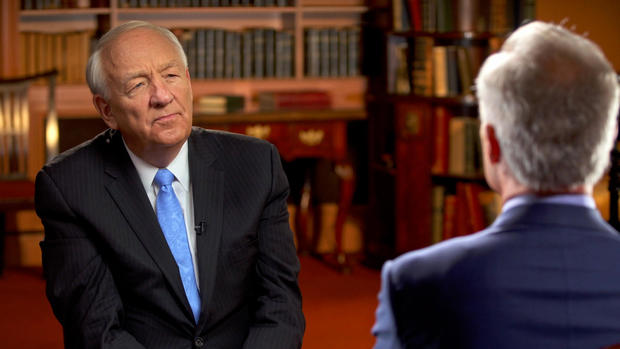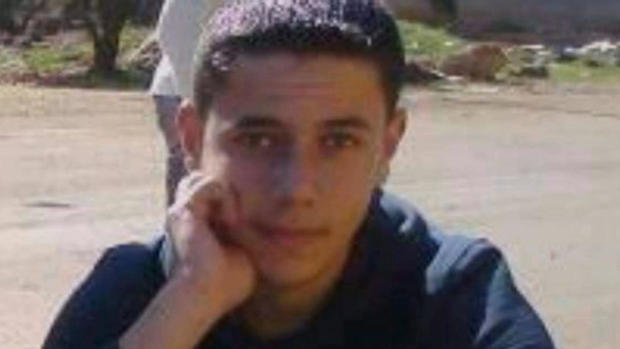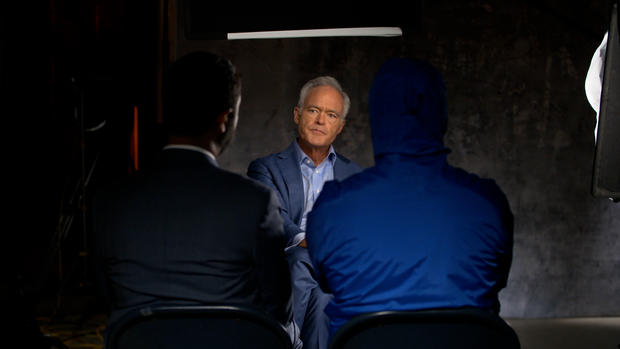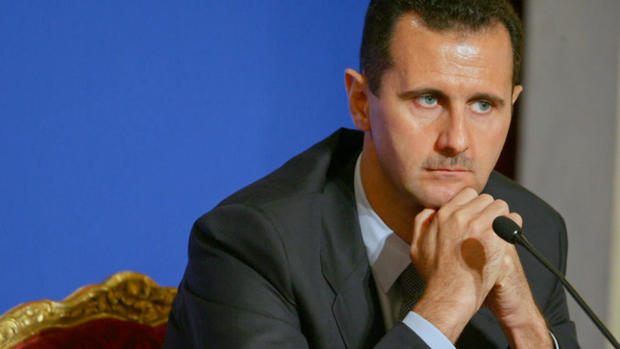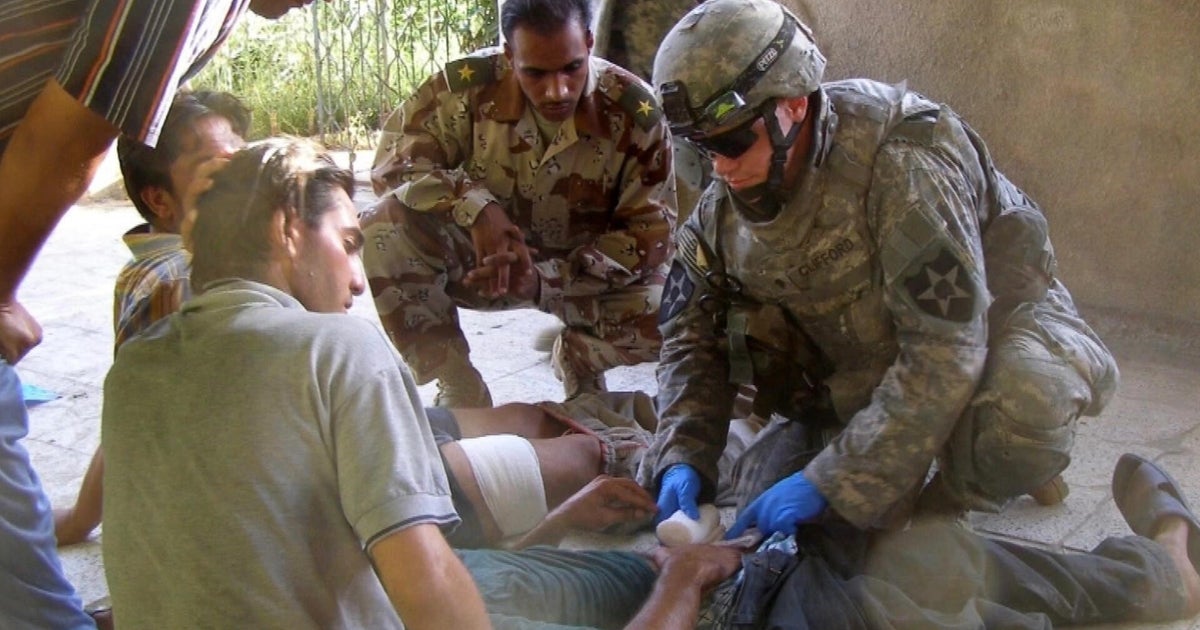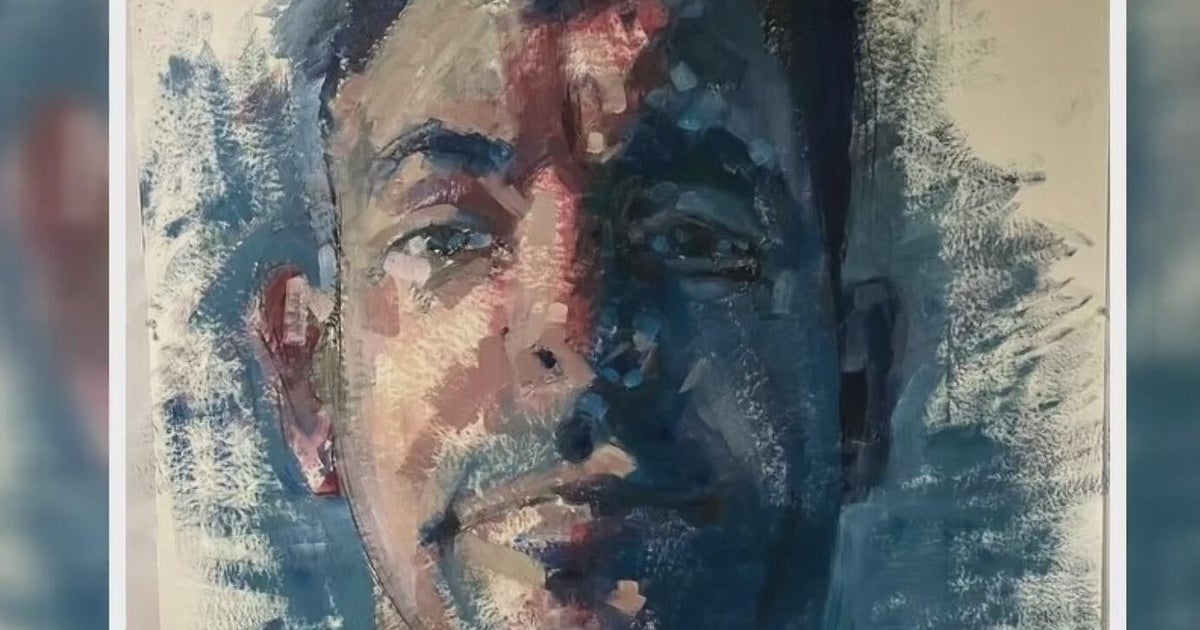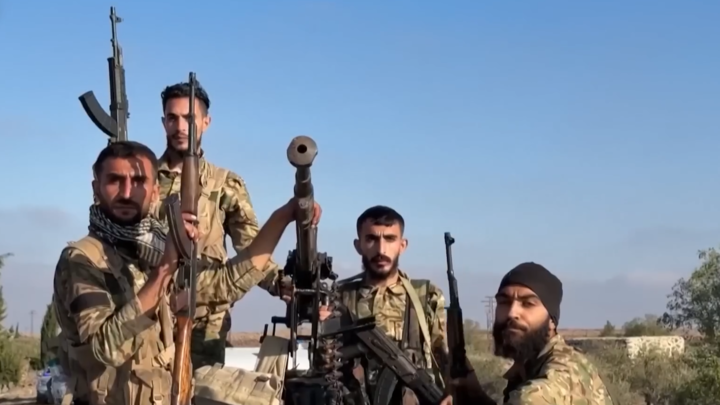The evidence of Syrian President Bashar Assad and his regime's legacy of war crimes
If you have children watching 60 Minutes tonight, that's usually a good thing, but this story is not for them. The images you are about to see are the honest evidence of the greatest war crimes of the 21st century. As we reported last winter, President Biden and his national security team face a horror that erupted when many of them were in the Obama administration. Last March brought the 10th anniversary of the popular uprising that began Syria's civil war. The Syrian dictator, Bashar al-Assad, has gassed the innocent, bombed hospitals and schools, and made thousands disappear. The evidence is hard to watch but it should be seen. Many risked their lives to tell this story so that, even if Assad is never arrested, he will be, forever, handcuffed to the truth.
Syrian President Bashar al-Assad did this. These are civilians of a Damascus suburb called Ghouta. In 2013, ghouta was held by rebels so the Syrian army shelled the neighborhood with internationally banned nerve gas. 1,400 men, women and children were exterminated. Assad had chosen to meet the popular uprising against him not with diplomacy, not with war among soldiers, but with terrorism without restraint.
Stephen Rapp: We have murder, we have extermination, we have torture, we have rape.
Stephen Rapp is helping to build cases against Assad and his regime. Rapp prosecuted war crimes in Rwanda and Sierra Leone and served as U.S. ambassador for war crimes issues for six years, until 2015.
Scott Pelley: Will there be justice for what's happened in Syria?
Stephen Rapp: I'm an optimistic American. I've seen other situations that we thought were pretty hopeless, where nobody thought there'd ever be justice where we succeeded. The possibilities are there and one of the ways that we build toward that is get the solid evidence now.
Much of what he calls solid evidence was abandoned in the warzone. More than 900,000 government documents have been smuggled out and archived by the Independent Commission for International Justice and Accountability. The commission is funded, in part, by the U.S. and European Union. Stephen Rapp is the commission's chair.
Scott Pelley: Do the documents that have been collected so far lead all the way to President Assad?
Stephen Rapp: There's no question they lead all the way to President Assad. I mean, this is a top down, organized effort. There are documents with his name on it. Clearly he organizes this strategy. Then we see orders down through the system to pick people up. We see reports back. We see reports back about well, we've got a real problem here, there are too many corpses stacking up.
Among the corpses is Ahmad al-Musalmani, a 14-year-old who was last seen on a bus headed to his mother's funeral. His family told human rights watch that Assad's military stopped the bus and found a protest song on Ahmad's phone. His family next saw his face, two years later, when an image of his tortured body was smuggled out by the man concealed in the blue windbreaker.
Caesar: Our job became solely to take photographs of the bodies of dead human beings that had been tortured to death or killed in the different intelligence branches.
The photographer's alias is "Caesar."
Scott Pelley: He was in the military?
We spoke to him with the translation help of Mouaz Moustafa, of the Syrian Emergency Task Force, which works to protect civilians. Caesar had been a military photographer for 13 years. In 2011, he was ordered to make a record at morgues that received the dead from Assad's secret prisons. We added a masking effect because his images are too horrific for television. The reality of what he saw, broke Caesar's allegiance to the regime. To protect Caesar's identity, these are his words in Moustafa's voice.
Caesar: It was very clear that they were tortured, not tortured for a day or two, tortured for many, many long months. They were emaciated bodies, purely skeletons. There were people, most of them had their eyes gouged out. There was electrocution, you could tell by the dark spots on their body that was used there. There was utilization of knives and also big cables and belts that was used to beat them. And so, we could see every type of torture on the bodies of these individuals.
'Every type of torture,' but the depravity of the gouged eyes leaves to the imagination how maiming was calculated to coerce information. By 2013, the bodies overflowed the morgues and spilled across a parking garage at a military hospital.
Caesar: When I would take photographs, I would think, how can this government be capable of doing this to its own people? I would also have feelings of sadness and anger at what I've seen. And, at the same time, a feeling of fear, that at any single moment, there's no reason that I wouldn't face the very same torture and be photographed later.
Scott Pelley: How did you get the photographs out?
Caesar: Every single day, I would get on the computer, I would use a flash drive to get all of the photographs that were taken that day, load them onto the flash drive and then in a secret and risky way go out from work and reach a close friend of mine, Sami, who would then take the flash drive and upload the flash drive on a daily basis onto his personal computer.
This is Caesar's friend, Sami, also an alias. For more than two years he uploaded the daily flash drive smuggled by Caesar. We interviewed Sami, again, with the help of Mouaz Moustafa.
Sami: It was a responsibility upon us, upon Caesar and I, a responsibility to the Syrian people to be able to show them-- prove to them, let them know what has been the fate of their loved ones. I remember I had a neighbor and her son was a friend of mine. I was looking at his photograph in one of the flash drives that Caesar had brought to me that day. And I remember every single day that mother would go back to the intelligence branch asking about her son, asking any information about him. And I couldn't even tell her the truth 'cause we didn't wanna be exposed as we were doing this documentation.
Scott Pelley: This is victim 9,700….
Sami: That's right
Sami pointed out the irony of police-state bureaucracy. Arabic numerals which one day may be a treasure for prosecutors. We blurred the numbers to protect the families of the dead.
Sami: With each body, there's usually three numbers associated with it written on different parts of their bodies. The first being the number of the detainee, the second is the number of the intelligence branch that tortured that individual to death. And the third number was given by the doctor which was a sequential number signifying which number of dead body he or she was.
Scott Pelley: You would think that the regime would wanna hide all of these things.
Stephen Rapp: People are basically covering their backside, following the procedures. And people will follow those procedures at peril of getting in trouble. But in the process of doing it, they're creating some of the strongest evidence that any of us who've prosecuted crimes here or elsewhere have ever seen.
Scott Pelley: How do we know that Caesar's photographs are authentic, and actually do show what they purport to show?
Stephen Rapp: Our own FBI verified the metadata and determined that everything was rock solid, that the whole group of photos represented, real people and real events.
The FBI analyzed Caesar's images. In the 242 pictures it sampled, the FBI says the "image files exhibit no artifacts or inconsistencies." One prisoner Caesar did not photograph is this man who goes by the alias, Ali. He was imprisoned because of the place of his birth.
Scott Pelley: Where were you born?
Ali: In Columbus, Ohio.
Scott Pelley: But you moved to Syria as a child?
Ali: Correct.
In 2012, on a trip from the U.S., Ali flew to Damascus. It was the second year of the war. He never made it out of the airport. His U.S. passport was a ticket to an underground prison.
Ali: One of the high-ranked intelligence officers told me, we don't care if you are American. We can kill you. We can keep you detained forever.
Three weeks of interrogation seemed like forever. He told us his feet were beaten with plastic pipe until he couldn't stand. Others, he said, were suspended on a wall by handcuffs and doused with boiling water. But the worst for him was a prisoner he never saw. Ali overheard an interrogation—a boy, judging from the screams.
Ali: I heard a child between 12 and 13 years old screaming, "Mama. Please help me out from the hell." When he screamed, just after pour water and then I can hear the whipping and hitting by like plastic pipe or like something like that.
As capriciously as he was taken, Ali was released to his family who hadn't known for 23 days why he never showed up at baggage claim.
Torture is one of many war crimes committed by Bashar al-Assad's regime. In 2017, we visited a bombed hospital. Thousands of medical facilities, schools and neighborhoods have been levelled by Assad and his ally, Russia. Assad has used banned chemical weapons more than 300 times according to an investigation by the Global Public Policy Institute. In all, about a quarter million civilians are dead. 12 million have been forced from their homes. Assad's opposition has committed atrocities too, but the scale cannot be compared.
Caesar: I did all of this. I risked my life and the lives of my family, in order to show and to expose to the entire world the true face of this dictatorship of the Assad regime.
Stephen Rapp: We've got better evidence-- against Assad and his clique-- than we had against Milosevic in Yugoslavia, or we had in any of the war crimes tribunals in which I've involved in, some extent, even better than we had against the Nazis at Nuremberg, because the Nazis didn't actually take individual pictures of each of their victims with identifying information on them.
Scott Pelley: You'd love to go to court--
Stephen Rapp: Oh I'd love that, yeah. This would be a great trial against Assad himself.
Trouble is, Assad has nearly won the war. The U.S. and others have imposed sanctions, but most criminals will be safe in Syria. The U.N. tried to refer Syria to the international criminal court but that was vetoed by Russia and China.
Scott Pelley: If Assad gets away with impunity, what has the world lost?
Stephen Rapp: If the word is that you can commit those crimes, and that you can get away with it, and this is the way that you suppress a popular uprising, then others will do the same thing. The future will be much more dangerous than the past, and a lot of what we built will be destroyed.
Already destroyed is what Syrians built over thousands of years. Assad is condemned to be the monarch of all he surveys. His trial may be distant but the witnesses are patient. Blind witnesses, who challenge the world to see, young witnesses for whom time no longer matters. They will wait because a crime buried without justice is never laid to rest.
Produced by Nicole Young. Associate producer, Katie Kerbstat. Broadcast associate, Ian Flickinger. Edited by Jorge J. García.

